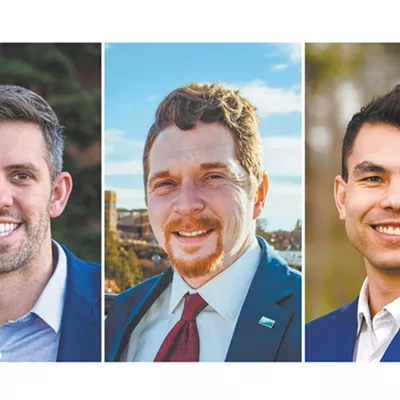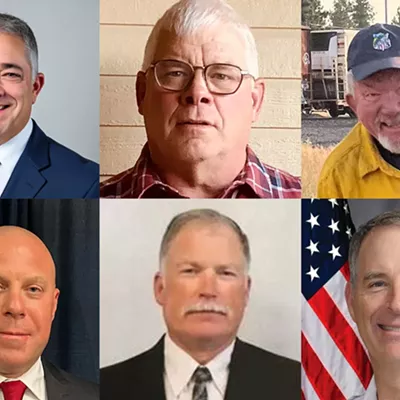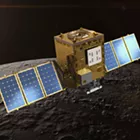On a bright October morning, I pull into the parking lot of Craven's Coffee at the Riverwalk complex, just south of the Gonzaga District. Inside the unassuming storefront, employees work, relaxed but efficient, around two massive vintage German roasters. Burlap sacks of green coffee beans from Ethiopia, Kenya, Guatemala, Costa Rica and Hawaii are stacked on the floor at the entrance. A world map hangs on the wall in front of me with string running from tacked coffee-producing countries to small descriptions of the diverse bean flavors that come from those areas. In a minute, Simon Craven-Thompson, who co-owns the 11-year-old roastery with his wife, Becky, strolls around the corner with a cheery British hello and proceeds to pour me one of Craven's aromatic, freshly brewed dark blends. As we pass through the workstations into a meeting room, Simon jokes about how the smell of roasted coffee beans has permeated everything in his closet; even his briefcase sends off hints of the earthy brew.
This is hardly representative of the grit and toil of the coffee industry, which comes second only to oil as the world's most valuable traded commodity. There's no indication at Craven's, for instance, of the depravity, the child labor or the inhuman working conditions that plague coffee plantations the world over.
"I travel a lot in Central America for my job, and you see it," Craven-Thompson says, when asked if he's actually witnessed child labor. He says it's especially prevalent in remote mountain estates and plantations: "For a few days, I felt like I was outside the infrastructure of society. The world does not see these people."
Craven-Thompson's observations about the coffee industry are a big reason his company offers Fair Trade coffee, which means the beans are certified by an organization that makes sure coffee farmers are paid a fair price and that no slave or child labor has been used to produce the crop. Craven-Thompson says Fair Trade has been a force in Europe for some time and that now U.S. coffee companies are beginning to focus on the growing niche of socially just coffee drinkers. You may not be getting a better quality coffee, but Fair Trade ensures the money you spend (which is roughly about the same as non-Fair Trade high-end coffee) is spread more evenly, giving Third World farmers a chance to make a better living.
"It's a real commitment," Craven-Thompson says, of becoming Fair Trade certified. As a business, Craven's Coffee cares about turning a profit. But Craven-Thompson says making money doesn't have to be unethical.
"I think Fair Trade has been a very good thing. To be Fair Trade-certified, you have to be part of a co-op system. People are beginning to appreciate relationship-based coffee [purchasing]. We tell them the story [of the farm their beans come from], and they embrace that." He explains that some of their best organic beans come from a co-op of Mayan Indians in Guatemala called Asobagri.
"It's a very isolated community. We have to bring translators because they don't even speak Spanish -- they speak their own language."
Marketing a product's "story" is proving to be as successful as marketing the product itself. A study conducted by the consulting firm Wirthlin Worldwide found that 82 percent of the consumers in its survey felt that "corporate citizenship" influenced their purchasing habits. Whether it's not buying stock in tobacco companies or picking up a Free Trade bag of beans, consumers have the power to put their morality where their money is.
According to an article published in Time magazine earlier this year, Mexico got about a third of every dollar spent on coffee 10 years ago; today it gets less than ten cents. Crops like cocaine and opium poppies are proving more profitable for poor workers, and many have switched over.
"The very best coffee in the world is cheaper than a Diet Coke," Craven-Thompson says. "It's unbelievable."
Even though demand is up, over-production has driven coffee prices down. To get Vietnam's economy up and running after the Vietnam War, Vietnamese farmers entered the coffee industry; the country now produces the bulk of what Craven-Thompson calls "really crap coffee," for really low prices -- the kind of slug you find in cafeterias and office break rooms.
The world's largest coffee companies -- Kraft, Procter & amp; Gamble, Sara Lee and Nestle -- purchase about half of the world's coffee beans. Purchasing control allows them to pay dismal fees, leaving growers with barely enough to survive. The "coffee crisis," as it's deemed, has caused many smaller coffee companies to choose which farms they buy beans from more carefully, basing their decisions on quality first, then price. Consumers have long known that coffee from smaller specialty coffee companies is likely to be of a better quality than say, the Folgers you'd find on supermarket shelves.
"All the way through the chain, there's no such thing as good, cheap coffee," says Craven-Thompson. "Whether it's at a grocery store, restaurant or drive-through." In other words, you get what you pay for.
Now consumers are starting to focus on more than taste. Where did their coffee come from? Did children harvest the beans? How much does the farmer make from the $3 latte or the $1 refillable cup of joe? Fair Trade certification answers these questions.
The organization that oversees Fair Trade in the U.S. is called TransFair, which mandates a bottom-line price. For non-organic, that price is $1.26 per pound; for organic, it's $1.41. As the market shifts, those prices can go up, but they never fall below those bottom lines. Non-Fair Trade prices can range anywhere from 60 or 70 cents a pound to as low as 10 cents a pound.
Some economists say Fair Trade meddles with the free market, but they seem to be in the minority. For the most part, Fair Trade has been a raging success, from the coffee farm to the percolator. The biggest debate exists among industry experts and connoisseurs, who often say Fair Trade and organic coffees don't always taste better, even though consumers seem to assume they should.
Hundreds of coffee companies are signing up with TransFair -- including Craven's, which began selling Fair Trade in 2000, and even the big corporations. Though the major coffee companies still buy the majority of their coffee from massive coffee estates and plantations, industry execs are jumping on the bandwagon, convinced Fair Trade is a profitable marketing technique. Millstone, for example, which is part of Proctor & amp; Gamble, recently introduced a Fair Trade coffee, and Dunkin' Donuts is using Fair Trade coffee to compete with Starbucks. The Seattle coffee behemoth reluctantly entered the Fair Trade coffee market four years ago after rallies and protests against its coffee purchasing habits. Still, Starbucks offers only one Fair Trade variety of coffee. The company claims there isn't enough consumer demand -- yet.
Meanwhile, the Fair Trade concept is expanding to other products. Fair Trade bananas, chocolate and other tropical fruits are showing promise in Europe and the United States. Certain clothing labels indicate sweatshop-free manufacturing, and watchdog organizations regularly update lists of companies that follow standard ethical-trading practices.
"I think it's spreading," says Craven-Thompson, regarding the demand for Fair Trade products. "Well, I say that, but then Wal-Mart is the largest retail company in the world and is a discount marketer. But you have to be careful what you wish for. Now you have all this stuff for really cheap, but what is the residual impact? What are the seeds that are sown for this?"
Out of nearly 3 billion pounds of coffee imported to the United States last year, Fair Trade accounted for less than 10 percent of sales. But Craven-Thompson thinks coffee drinkers want more than good coffee; they want a good product from a good company.
"Is the next generation [about] contentious capitalism? I'm a capitalist, a business owner. We're trying to grow, but we're careful to involve the community -- it's a crucial thing. [Something] like Fair Trade is a vehicle that can help define what you do and communicate to people that you're trying to do the right thing."
Publication date: 10/14/04














